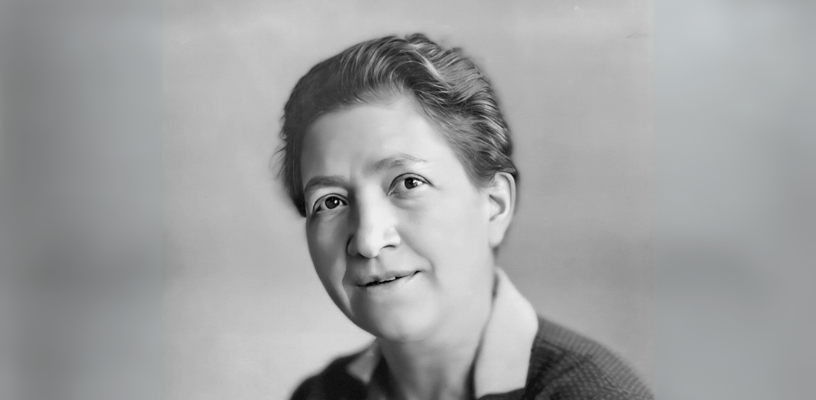Maria Herz: Her Life and Music

Maria Herz gained popularity as a composer in the early 20th century, before fading into obscurity in the following decades. A century later, her music is experiencing a resurgence. Part of a profile series throughout March – Women’s History Month – in which we explore the lives, music, and inspirations of extraordinary composers from around the world. View more women composer profiles here.
Her Story
Born as Maria Bing on 19 August 1878, Maria Herz was the youngest child of a Jewish textile dynasty in Cologne. From an early age she received piano instruction from Max von Pauer, a renowned professor at the Cologne Conservatory. After her marriage to chemist Albert Herz in 1901, she moved with him to the United Kingdom, had four children by 1910, and began to compose in the Romantic style. She also organised lecture concerts, in which she appeared as pianist, composer, and speaker. Her composition teacher was none other than Arthur Edmund Grimshaw, first ever choir master and organist of Leeds cathedral. He even dedicated one of his own compositions to her, a string quartet entitled Variations on a Theme by Mrs Herz.
Blindsided by the outbreak of war during a stay in Germany in the summer of 1914, the Herz family couldn’t return to England and therefore remained in Cologne. Albert Herz survived military service during World War I but later died of the Spanish flu in 1920. Newly widowed, Maria Herz began composing again, now orienting herself on modern trends and adopting the pseudonym Albert Maria Herz. Writing under her husband’s name enabled greater recognition of her work. The premiere of her Four Short Orchestral Pieces, op. 8, in 1929 at Cologne’s Gürzenich Hall under Hermann Abendroth marked the apex of her oeuvre.
Threatened as a Jewish woman by the emerging Nazi dictatorship, Herz fled Germany and for some time moved restless through England, Switzerland, and France, until she settled in Birmingham in 1935. At this time, she ceased composing; her last piece of music is a Baroque inspired Concerto for Harpsichord (or Piano) and String Orchestra with Flute. After the war she and her son Robert emigrated to join her daughters in the United States. She died in New York in 1950 after a brief but serious illness.
Her estate remained with her descendants in the US, where most of her music lay forgotten in drawers, until Albert Herz, a grandson living in Zurich, brought it to Switzerland in 1995 and donated it to Zurich Central Library in 2015. At this point, Maria Herz’s name and biography, as well as her music, were completely unknown.
However, a promising turn of events unfolded—a rarity often denied to many anonymous figures in music history: musicians gradually began to take notice of Maria Herz and incorporate her music into their programmes. Her work is now been published by Boosey & Hawkes.
Her Sound
Herz’s list of works includes a number of songs for solo voice and piano, chamber music, solo concertos for piano and cello, as well as choral and orchestral works. They are characterised by a distinctive and authentic idiom that ranges stylistically between the late Romantic and early modern periods with a neoclassical flavour. In the programme sheet for the premiere of Four Short Orchestral Pieces, Herbert Eimert described her musical style as having a “contemporary attitude and subtle assurance in personal expression. As an essential trait of her works, a spiritually directed clarity of feeling averse to all outward splendour shows itself, from which arises the preference for the means of chamber music, the transparency of form, and a gesture of sound that at times inclines toward the ascetic.”
Collaborators
Maria Herz's music is currently undergoing rediscovery, gradually returning to concert halls. Her final piece, the aforementioned Concerto, premiered in Zurich in 2020, 85 years after its composition.
> Listen here
The Rundfunk-Sinfonierchester Berlin ist currently preparing the world premiere recording of Maria Herz’s Piano Concerto, Celllo Concerto, the Four Short Orchestral Pieces, and the Orchestra Suite. The orchestra is led by Christiane Silber, soloists are pianist Oliver Triendl and cellist Konstanze von Gutzeit. The recording will be released in May 2024.
In recent years, select works by Herz, including her String Quartet in B minor, have been recorded by such esteemed ensembles as E-MEX-Ensemble, Asasello Quartett and singer Christiane Oelze.
> Listen here
Members of Rundfunk-Sinfonieorchester Berlin will present the String Quartet in B minor in the upcoming weeks in Berlin, and cellist Raphaela Gromes gives the Cello Concerto its German premiere in April 2024.
Photo: Zurich Central Library
